- Home
- Beverly Cleary
Ramona and Her Father Page 3
Ramona and Her Father Read online
Page 3
“He’ll just have to learn to eat what we can afford,” said Mr. Quimby. “Or we will get rid of him.”
This statement shocked Ramona. Picky-picky had been a member of the family since before she was born.
“Well, I don’t blame him,” said Beezus, picking up the cat and pressing her cheek against his fur. “Puss-puddy stinks.”
Mr. Quimby ground out his cigarette.
“Guess what?” said Mrs. Quimby, as if to change the subject. “Howie’s grandmother drove out to visit her sister, who lives on a farm, and her sister sent in a lot of pumpkins for jack-o’-lanterns for the neighborhood children. Mrs. Kemp gave us a big one, and it’s down in the basement now, waiting to be carved.
“Me! Me!” cried Ramona. “Let me get it!”
“Let’s give it a real scary face,” said Beezus, no longer difficult.
“I’ll have to sharpen my knife,” said Mr. Quimby.
“Run along and bring it up, Ramona,” said Mrs. Quimby with a real smile.
Relief flooded through Ramona. Her family had returned to normal. She snapped on the basement light, thumped down the stairs, and there in the shadow of the furnace pipes, which reached out like ghostly arms, was a big, round pumpkin. Ramona grasped its scratchy stem, found the pumpkin too big to lift that way, bent over, hugged it in both arms, and raised it from the cement floor. The pumpkin was heavier than she had expected, and she must not let it drop and smash all over the concrete floor.
“Need some help, Ramona?” Mrs. Quimby called down the stairs.
“I can do it.” Ramona felt for each step with her feet and emerged, victorious, into the kitchen.
“Wow! That is a big one.” Mr. Quimby was sharpening his jackknife on a whetstone while Beezus and her mother hurried through the dishes.
“A pumpkin that size would cost a lot at the market,” Mrs. Quimby remarked. “A couple of dollars, at least.”
“Let’s give it eyebrows like last year,” said Ramona.
“And ears,” said Beezus.
“And lots of teeth,” added Ramona. There would be no jack-o’-lantern with one tooth and three triangles for eyes and nose in the Quimbys’ front window on Halloween. Mr. Quimby was the best pumpkin carver on Klickitat Street. Everybody knew that.
“Hmm. Let’s see now.” Mr. Quimby studied the pumpkin, turning it to find the best side for the face. “I think the nose should go about here. With a pencil he sketched a nose-shaped nose, not a triangle, while his daughters leaned on their elbows to watch.
“Shall we have it smile or frown?” he asked.
“Smile!” said Ramona, who had had enough of frowning.
“Frown!” said Beezus.
The mouth turned up on one side and down on the other. Eyes were sketched and eyebrows. “Very expressive,” said Mr. Quimby. “Something between a leer and a sneer.” He cut a circle around the top of the pumpkin and lifted it off for a lid.
Without being asked, Ramona found a big spoon for scooping out the seeds.
Picky-picky came into the kitchen to see if something beside Puss-puddy had been placed in his dish. When he found that it had not, he paused, sniffed the unfamiliar pumpkin smell, and with his tail twitching angrily stalked out of the kitchen. Ramona was glad Beezus did not notice.
“If we don’t let the candle burn the jack-o’-lantern, we can have pumpkin pie,” said Mrs. Quimby. “I can even freeze some of the pumpkin for Thanksgiving.”
Mr. Quimby began to whistle as he carved with skill and care, first a mouthful of teeth, each one neat and square, then eyes and jagged, ferocious eyebrows. He was working on two ears shaped like question marks, when Mrs. Quimby said, “Bedtime, Ramona.”
“I am going to stay up until Daddy finishes,” Ramona informed her family. “No ifs, ands, or buts.”
“Run along and take your bath,” said Mrs. Quimby, “and you can watch awhile longer.”
Because her family was happy once more, Ramona did not protest. She returned quickly, however, still damp under her pajamas, to see what her father had thought of next. Hair, that’s what he had thought of, something he could carve because the pumpkin was so big. He cut a few C-shaped curls around the hole in the top of the pumpkin before he reached inside and hollowed out a candle holder in the bottom.
“There,” he said and rinsed his jackknife under the kitchen faucet. “A work of art.”
Mrs. Quimby found a candle stub, inserted it in the pumpkin, lit it, and set the lid in place. Ramona switched off the light. The jack-o’-lantern leered and sneered with a flickering flame.
“Oh, Daddy!” Ramona threw her arms around her father. “It’s the wickedest jack-o’-lantern in the whole world.”
Mr. Quimby kissed the top of Ramona’s head. “Thank you. I take that as a compliment. Now run along to bed.”
Ramona could tell by the sound of her father’s voice that he was smiling. She ran off to her room without thinking up excuses for staying up just five more minutes, added a postscript to her prayers thanking God for the big pumpkin, and another asking him to find her father a job, and fell asleep at once, not bothering to tuck her panda bear in beside her for comfort.
In the middle of the night Ramona found herself suddenly awake without knowing why she was awake. Had she heard a noise? Yes, she had. Tense, she listened hard. There it was again, a sort of thumping, scuffling noise, not very loud but there just the same. Silence. Then she heard it again. Inside the house. In the kitchen. Something was in the kitchen, and it was moving.
Ramona’s mouth was so dry she could barely whisper, “Daddy!” No answer. More thumping. Someone bumped against the wall. Someone, something was coming to get them. Ramona thought about the leering, sneering face on the kitchen table. All the ghost stories she had ever heard, all the ghostly pictures she had ever seen flew through her mind. Could the jack-o’-lantern have come to life? Of course not. It was only a pumpkin, but still—A bodyless, leering head was too horrifying to think about.
Ramona sat up in bed and shrieked, “Daddy!”
A light came on in her parents’ room, feet thumped to the floor, Ramona’s tousled father in rumpled pajamas was silhouetted in Ramona’s doorway, followed by her mother tugging a robe on over her short nightgown.
“What is it, Baby?” asked Mr. Quimby. Both Ramona’s parents called her Baby when they were worried about her, and tonight Ramona was so relieved to see them she did not mind.
“Was it a bad dream?” asked Mrs. Quimby.
“Th-there’s something in the kitchen.” Ramona’s voice quavered.
Beezus, only half-awake, joined the family. “What’s happening?” she asked. “What’s going on?”
“There’s something in the kitchen,” said Ramona, feeling braver. “Something moving.”
“Sh-h!” commanded Mr. Quimby.
Tense, the family listened to silence.
“You just had a bad dream.” Mrs. Quimby came into the room, kissed Ramona, and started to tuck her in.
Ramona pushed the blanket away. “It was not a bad dream,” she insisted. “I did too hear something. Something spooky.”
“All we have to do is look,” said Mr. Quimby, reasonably—and bravely, Ramona thought. Nobody would get her into that kitchen.
Ramona waited, scarcely breathing, fearing for her father’s safety as he walked down the hall and flipped on the kitchen light. No shout, no yell came from that part of the house. Instead her father laughed, and Ramona felt brave enough to follow the rest of the family to see what was funny.
There was a strong smell of cat food in the kitchen. What Ramona saw, and what Beezus saw, did not strike them as one bit funny. Their jack-o’-lantern, the jack-o’-lantern their father had worked so hard to carve, no longer had a whole face. Part of its forehead, one ferocious eyebrow, one eye, and part of its nose were gone, replaced by a jagged hole edged by little teeth marks. Picky-picky was crouched in guilt under the kitchen table.
The nerve of that cat. “Bad cat! Bad cat!”
shrieked Ramona, stamping her bare foot on the cold linoleum. The old yellow cat fled to the dining room, where he crouched under the table, his eyes glittering out of the darkness.
Mrs. Quimby laughed a small rueful laugh. “I knew he liked canteloupe, but I had no idea he liked pumpkin, too.” With a butcher’s knife she began to cut up the remains of the jack-o’-lantern, carefully removing, Ramona noticed, the parts with teeth marks.
“I told you he wouldn’t eat that awful Puss-puddy.” Beezus was accusing her father of denying their cat. “Of course he had to eat our jack-o’-lantern. He’s starving.”
“Beezus, dear,” said Mrs. Quimby. “We simply cannot afford the brand of food Picky-picky used to eat. Now be reasonable.”
Beezus was in no mood to be reasonable. “Then how come Daddy can afford to smoke?” she demanded to know.
Ramona was astonished to hear her sister speak this way to her mother.
Mr. Quimby looked angry. “Young lady,” he said, and when he called Beezus young lady, Ramona knew her sister had better watch out. “Young lady, I’ve heard enough about that old tom cat and his food. My cigarettes are none of your business.”
Ramona expected Beezus to say she was sorry or maybe burst into tears and run to her room. Instead she pulled Picky-picky out from under the table and held him to her chest as if she were shielding him from danger. “They are too my business,” she informed her father. “Cigarettes can kill you. Your lungs will turn black and you’ll die! We made posters about it at school. And besides, cigarettes pollute the air!”
Ramona was horrified by her sister’s daring, and at the same time she was a tiny bit pleased. Beezus was usually well-behaved while Ramona was the one who had tantrums. Then she was struck by the meaning of her sister’s angry words and was frightened.
“That’s enough out of you,” Mr. Quimby told Beezus, “and let me remind you that if you had shut that cat in the basement as you were supposed to, this would never have happened.”
Mrs. Quimby quietly stowed the remains of the jack-o’-lantern in a plastic bag in the refrigerator.
Beezus opened the basement door and gently set Picky-picky on the top step. “Nighty-night,” she said tenderly.
“Young lady,” began Mr. Quimby. Young lady again! Now Beezus was really going to catch it. “You are getting altogether too big for your britches lately. Just be careful how you talk around this house.”
Still Beezus did not say she was sorry. She did not burst into tears. She simply stalked off to her room.
Ramona was the one who burst into tears. She didn’t mind when she and Beezus quarreled. She even enjoyed a good fight now and then to clear the air, but she could not bear it when anyone else in the family quarreled, and those awful things Beezus said—were they true?
“Don’t cry, Ramona.” Mrs. Quimby put her arm around her younger daughter. “We’ll get another pumpkin.”
“B-but it won’t be as big,” sobbed Ramona, who wasn’t crying about the pumpkin at all. She was crying about important things like her father being cross so much now that he wasn’t working and his lungs turning black and Beezus being so disagreeable when before she had always been so polite (to grown-ups) and anxious to do the right thing.
“Come on, let’s all go to bed and things will look brighter in the morning,” said Mrs. Quimby.
“In a few minutes.” Mr. Quimby picked up a package of cigarettes he had left on the kitchen table, shook one out, lit it, and sat down, still looking angry.
Were his lungs turning black this very minute? Ramona wondered. How would anybody know, when his lungs were inside him? She let her mother guide her to her room and tuck her in bed.
“Now don’t worry about your jack-o’lantern. We’ll get another pumpkin. It won’t be as big, but you’ll have your jack-o’-lantern.” Mrs. Quimby kissed Ramona good-night.
“Nighty-night,” said Ramona in a muffled voice. As soon as her mother left, she hopped out of bed and pulled her old panda bear out from under the bed and tucked it under the covers beside her for comfort. The bear must have been dusty because Ramona sneezed.
“Gesundheit!” said Mr. Quimby, passing by her door. “We’ll carve another jack-o’-lantern tomorrow. Don’t worry.” He was not angry with Ramona.
Ramona snuggled down with her dusty bear. Didn’t grown-ups think children worried about anything but jack-o’-lanterns? Didn’t they know children worried about grown-ups?
4
Ramona to the Rescue
The Quimbys said very little at breakfast the next morning. Beezus was moody and silent. Mrs. Quimby, in her white uniform, was in a hurry to leave for work. Picky-picky resentfully ate a few bites of Puss-puddy. Mr. Quimby did not say, “I told you he would eat it when he was really hungry,” but the whole family was thinking it. He might as well have said it.
Ramona wished her family would cheer up. When they had finished eating, she found herself alone with her father.
“Bring me an ashtray, please,” said Mr. Quimby. “That’s a good girl.”
Reluctantly Ramona brought the ashtray and, with her face rigid with disapproval, watched her father light his after-breakfast cigarette.
“Why so solemn?” he asked as he shook out the flame of the match.
“Is it true what Beezus said?” Ramona demanded.
“About what?” asked Mr. Quimby.
Ramona had a feeling her father really knew what she meant. “About smoking will make your lungs turn black,” she answered.
Mr. Quimby blew a puff of smoke toward the ceiling. “I expect to be one of those old men with a long gray beard who has his picture in the paper on his hundredth birthday and who tells reporters he owes his long life to cigarettes and whiskey.”
Ramona was not amused. “Daddy”—her voice was stern—“you are just being silly again.”
Her father took a deep breath and blew three smoke rings across the table, a most unsatisfactory answer to Ramona.
On the way to school Ramona cut across the lawn for the pleasure of leaving footprints in the dew and then did not bother to look back to see where she had walked. Instead of running or skipping, she trudged. Nothing was much fun anymore when her family quarreled and then was silent at breakfast and her father’s lungs were turning black from smoke.
Even though Mrs. Rogers announced, “Today our second grade is going to have fun learning,” as she wrote the date on the black-board, school turned out to be dreary because the class was having Review again. Review meant boredom for some, like Ramona, because they had to repeat what they already knew, and worry for others, like Davy, because they had to try again what they could not do in the first place. Review was the worst part of school. Ramona passed the morning looking through her workbook for words with double o’s like book and cook. She carefully drew eyebrows over the o’s and dots within, making the o’s look like crossed eyes. Then she drew mouths with the ends turned down under the eyes. When she finished, she had a cross-looking workbook that matched her feelings.
She was in no hurry to leave the building at recess, but when she did, Davy yelled, “Look out! Here comes Ramona!” and began to run, so of course Ramona had to chase him around and around the playground until time to go inside again.
Running until she was hot and panting made Ramona feel so much better that she was filled with sudden determination. Her father’s lungs were not going to turn black. She would not let them. Ramona made up her mind, right then and there in the middle of arithmetic, that she was going to save her father’s life.
That afternoon after school Ramona gathered up her crayons and papers from the kitchen table, took them into her room, and shut the door. She got down on her hands and knees and went to work on the bedroom floor, printing a sign in big letters. Unfortunately, she did not plan ahead and soon reached the edge of the paper. She could not find the Scotch tape to fasten two pieces of paper together, so she had to continue on another line. When she finished, her sign read:
It would
do. Ramona found a pin and fastened her sign to the living-room curtains, where her father could not miss it. Then she waited, frightened by her daring.
Mr. Quimby, although he must have seen the sign, said nothing until after dinner when he had finished his pumpkin pie. He asked for an ashtray and then inquired, “Say, who is this Mr. King?”
“What Mr. King?” asked Ramona, walking into his trap.
“Nosmo King,” answered her father without cracking a smile.
Chagrined, Ramona tore down her sign, crumpled it, threw it into the fireplace, and stalked out of the room, resolving to do better the next time.
The next day after school Ramona found the Scotch tape and disappeared into her room to continue work on her plan to save her father’s life. While she was working, she heard the phone ring and waited, tense, as the whole family now waited whenever the telephone rang. She heard her father clear his throat before he answered. “Hello?” After a pause he said, “Just a minute, Howie. I’ll call her.” There was disappointment in his voice. No one was calling to offer him a job after all.
“Ramona, can you come over and play?” Howie asked, when Ramona went to the telephone.
Ramona considered. Of course they would have to put up with Howie’s messy little sister, Willa Jean, but she and Howie would have fun building things if they could think of something to build. Yes, she would like to play with Howie, but saving her father’s life was more important. “No, thank you. Not today,” she said. “I have important work to do.”
Just before dinner she taped to the refrigerator door a picture of a cigarette so long she had to fasten three pieces of paper together to draw it. After drawing the cigarette, she had crossed it out with a big black X and under it she had printed in big letters the word BAD. Beezus giggled when she saw it, and Mrs. Quimby smiled as if she were trying not to smile. Ramona was filled with fresh courage. She had allies. Her father had better watch out.
When Mr. Quimby saw the picture, he stopped and looked while Ramona waited. “Hmm,” he said, backing away for a better view. “An excellent likeness. The artist shows talent.” And that was all he said.

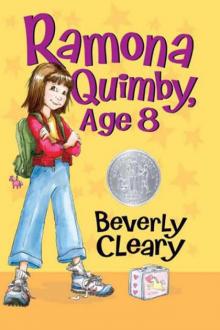 Ramona Quimby, Age 8
Ramona Quimby, Age 8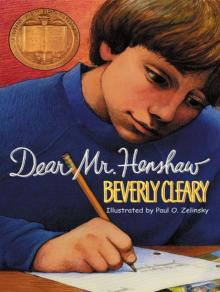 Dear Mr. Henshaw
Dear Mr. Henshaw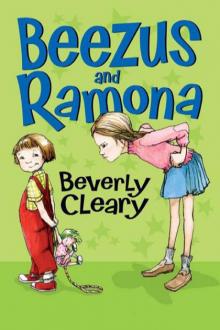 Beezus and Ramona
Beezus and Ramona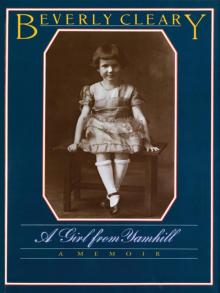 A Girl from Yamhill
A Girl from Yamhill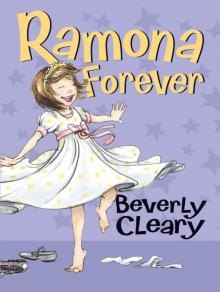 Ramona Forever
Ramona Forever Jean and Johnny
Jean and Johnny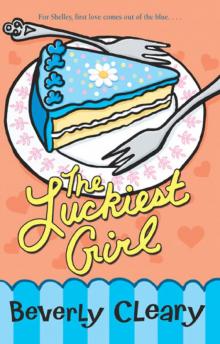 The Luckiest Girl
The Luckiest Girl Emily's Runaway Imagination
Emily's Runaway Imagination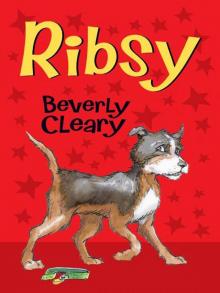 Ribsy
Ribsy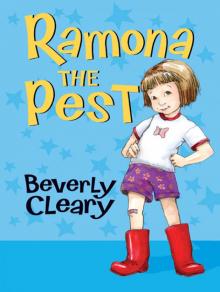 Ramona the Pest
Ramona the Pest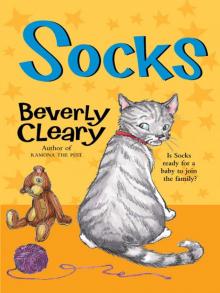 Socks
Socks Ramona's World
Ramona's World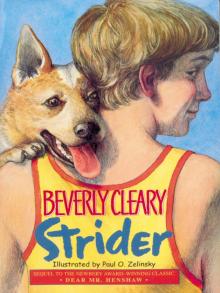 Strider
Strider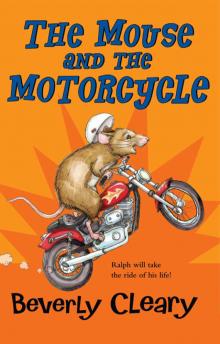 The Mouse and the Motorcycle
The Mouse and the Motorcycle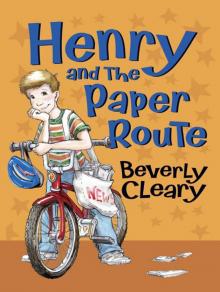 Henry and the Paper Route
Henry and the Paper Route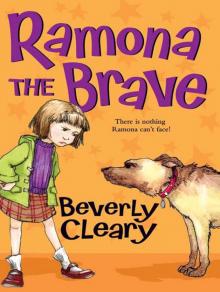 Ramona the Brave
Ramona the Brave Henry Huggins
Henry Huggins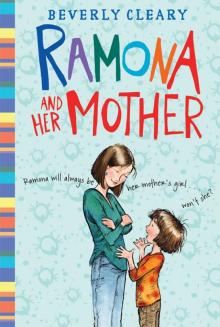 Ramona and Her Mother
Ramona and Her Mother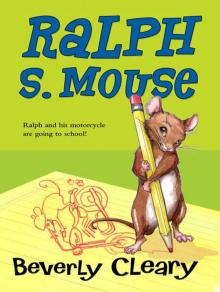 Ralph S. Mouse
Ralph S. Mouse Sister of the Bride
Sister of the Bride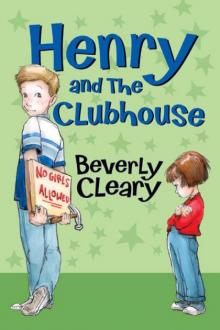 Henry and the Clubhouse
Henry and the Clubhouse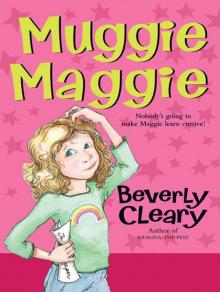 Muggie Maggie
Muggie Maggie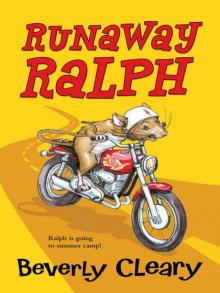 Runaway Ralph
Runaway Ralph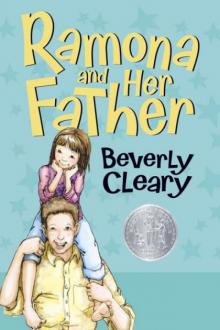 Ramona and Her Father
Ramona and Her Father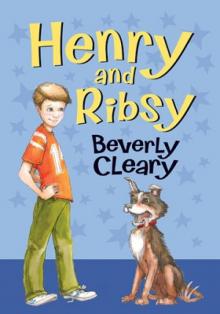 Henry and Ribsy
Henry and Ribsy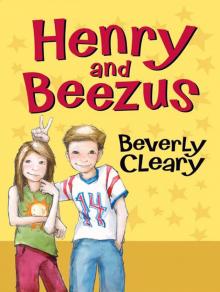 Henry and Beezus
Henry and Beezus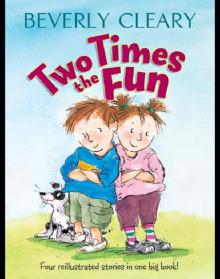 Two Times the Fun
Two Times the Fun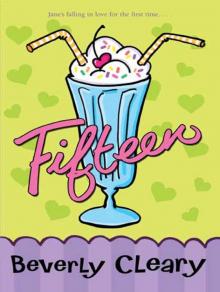 Fifteen
Fifteen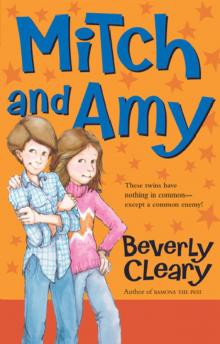 Mitch and Amy
Mitch and Amy